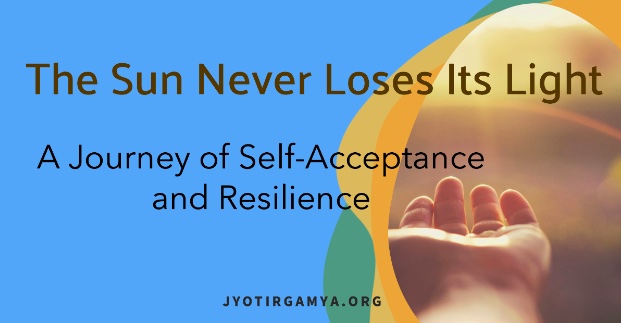The Sun Never Loses its Light: A Journey of Self-Acceptance and Resilience
Story
As the brilliant young man took over his ailing father’s business, he was filled with a sense of duty and responsibility. He had always been known for his sharp mind and quick thinking, and he was determined to bring success to the business that had been his father’s pride.
However, despite his best efforts, things went differently than planned. The employees were happy under the new regime, but the business sank into debt. The weight of the situation was overwhelming, and he found himself constantly questioning his abilities and decisions.
The once energetic and confident young man started to lose his spark. He withdrew from his usual activities, and his self-critical voice grew louder. He blamed himself for the failure of the business, feeling like he had let down his father’s legacy and the employees who had put their trust in him. He was consumed by guilt and self-doubt, and his once-bright future seemed to fade.
Feeling lost and defeated, he sought help from Dr. Dipali Ajinkya, a renowned therapist known for her compassionate approach to emotional healing. Dr. Ajinkya helped the young man explore his feelings, fears, and beliefs through their sessions. She gently guided him to see that failure is a part of life and does not define his worth. She helped him understand that mistakes happen and that learning from them is essential rather than dwelling in self-blame.

Dr. Ajinkya encouraged the young man to shift his perspective and focus on his strengths and accomplishments. She helped him realize that he had taken on a tremendous responsibility at a young age and that facing challenges was natural. Furthermore, she reminded him that success is not always measured by external achievements but also by inner growth and resilience.
Gradually, the young man started to see a glimmer of hope. He began to let go of self-blame and forgave himself for his mistakes. He learned to accept the situation as a valuable learning experience and to see it as an opportunity for growth.
The young man regained his confidence and zest for life. He learned to embrace challenges as opportunities for personal and professional development. He found joy in small victories and learned to appreciate the present moment. He realized that life is unpredictable and that setbacks are temporary, just like an eclipse that eventually passes, but the sun never loses its light.
Today, the young man leads a content life. He has developed a deeper understanding of himself and the world around him. He has learned to be kinder to himself and others, and he is grateful for the lessons he learned from his experiences. He is no longer afraid of taking on challenges and is eager to face whatever life offers with courage and resilience. With emotional depth and newfound wisdom, he is ready to embrace life’s journey with open arms, knowing he has the tools to navigate its ups and downs.
Introduction
The above is one of many cases she has dealt with, spanning a career over two decades. Initially, she started as a physician but inspired by her husband; she took on psychotherapy. Together the couple has authored a book on their work, linked in the footer.
This interview delves into the importance of mental health balance, the role of medications, the need to update thought patterns, and actionable steps to build newer neural roadmaps in the brain.

Q: What is paracetamol for mental health?
There are two aspects to looking at mental health remedies. The first is preventive, and the second involves undergoing therapy.
Preventive involves relaxation, breathing, or mindfulness exercise and being in the present.
However, if an individual finds it hard to handle his emotions alone, or if (s)he sees a significant change in sleep or behavior that persists over 2 - 3 weeks, it is about time to see a counselor.
The behavior shift could be anything from getting angry more frequently, crying very quickly, lethargy, marginally reduced toleration capacity, lack of energy for any physical activity, lack of motivation, muttering to self, hallucination, rapid fluctuation of emotions, or questioning your existence.
Q: Most psychosis-related issues are related to the serotonin imbalance in the brain. Tell us about the brain, hormones, and mental health balance.
An activated amygdala suggests emotional imbalance, whereas an active prefrontal cortex suggests a healthier state. While measuring the hormone levels is complex, the proxy is to get a Functional Magnetic Resonance Imaging (fMRI) done to understand the individual’s state—relaxation exercises and mindfulness help build neuroplasticity. For permanent change to occur to your neuronal circuit, it takes about 20 mins of exercise at a stretch for 6 - 8 weeks.
Q: Tell us about the state of the medication. Do we need to take the medications lifelong? What are the side effects of long-term medications, if any?
Medications are usually prescribed when the emotions are not controllable but preventive measures, counseling, and cognitive therapies work.
There has been a drastic change in the present-day molecules compared to that of about 15 years back. It is a myth that once you start a medicine, you must keep it forever. The newer molecules have far lesser side effects than their predecessors. Take the case of schizophrenia, for instance. A decade ago, it would be complex medicines and shock therapy if required. Currently, the doses at the start have to be high, but gradually they are tapered down.
If you have diarrhea, you can’t keep eating junk food and asking for medicine. In the case of mental health issues, it is your thoughts, beliefs, self-talk, and attitude toward yourself and your surroundings. The thought pattern and belief systems need to be updated.
Q: We are a product of conditioning, initially the surroundings and then the self. What can be done to rewire that which is redundant and obsolete?
I love old songs, and I keep watching them on youtube. The software knows what I like and shows me accordingly. Youtube will gradually show new songs if I feel energetic and switch my genre. Our thought patterns work in the same way. We must identify what is not helpful and replace it with more helpful thoughts; the brain will adapt over time.
Q: Tell us a few actionable on updating the conditioning and building newer neural roadmaps in the brain?
When you go to the gym, the instructor first asks you to do cardio to shed off the extra fat and then weight training to tone the muscles. With your mind, identification of harmful thought patterns is cardio, and replacing them with more helpful thoughts is strength training.
Journalling is very helpful when it comes to identifying harmful thought patterns. Journaling is adapting to more positive thoughts, not just logging what happened during the day. Techniques like self-affirmation or autosuggestion should be used to replace the older patterns with fresh, strong thoughts.
Other techniques like creative visualization to arrive at your desired state, self-hypnosis(ideally under the supervision of an expert), or simple mindfulness are also of help.
Q: Where do you see the state of mental health, challenges, and future?
People are moving away from the stigma that I need help. Corporations are holding workshops for employees. The government has started a helpline. All this said, those slightly older generations are still reluctant to seek help. There needs to be more accepting of the psychological problems. More youngsters are pursuing a career in psychology.
Conclusion
The state of mental health is evolving positively, with growing awareness and acceptance of seeking help for psychological issues. Corporations are organizing workshops for employees, the government has introduced toll-free helplines, and more young people are pursuing careers in psychology. However, there still exists a reluctance among some in the older generation to seek help and a lack of acceptance regarding the treatability of psychological problems. By updating harmful thought patterns and using techniques like self-affirmation, creative visualization, and mindfulness, individuals can build newer neural roadmaps in their brains and promote better mental health. With continued efforts towards reducing stigma and increasing awareness, the future of mental health looks promising.
Related Articles
Decoding Trauma & Discovering Passion
How to write your daily journal?
Urge to Control is the Mother of Anxiety
Want to stay connected? Here’s our twitter.
Medical Hypnosis Book - A Practitioner’s Guide to Clinical Hypnotherapy